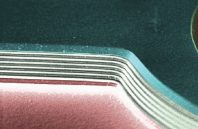A new method developed by Northwestern Engineering’s Manijeh Razeghi has greatly reduced a type of image distortion caused by the presence of spectral cross-talk between dual-band long-wavelength photodetectors.
The work opens the door for a new generation of high spectral-contrast infrared imaging devices with applications in medicine, defense and security, planetary sciences, and art preservation.
“Dual-band photodetectors offer many benefits in infrared imaging, including higher quality images and more available data for image processing algorithms,” said Razeghi, Walter P. Murphy Professor of Electrical and Computer Engineering in the McCormick School of Engineering. “However, performance can be limited by spectral cross-talk interference between the two channels, which leads to poor spectral contrast and prevents infrared camera technology from reaching its true potential.”

 (585) 768-2513
(585) 768-2513

